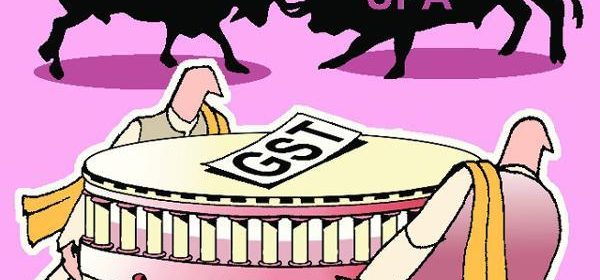GST- Deshbhakti while in opposition

BJP opposed a much better GST bill giving spurious excuses during 2009-2014.
Do real “Deshbhakts” think of Nation’s interest only when in power?
Prime Minister Modi and Finance Minister Arun Jaitley have been telling everyone how good GST is for the country, and also how it may add 2% to the GDP growth every year.
- Work on GST started under Vajpayee Govt. Yashwant Sinha deserves a lot of credit for it.
- An empowered group of State Finance Ministers created the draft. This group was led, on many occasions, by FMs of opposition ruled states (BJP/CPI). So, any “posturing” after the initial draft from this group, that aimed to be “revenue neutral for states”, should be seen as “bargaining chips”.
- We all know these – for some state leaders, this is usually about stopping some CBI enquiry or the other, some states always seek a “special package” from the centre.
- BJP’s STATED reasons, at the time, for opposing the bill were that it “will curtail the autonomy of states” and that GST was “against the spirit of federal structure” and “Sarkaria commission report”.
To hand over all the powers to the Centre and then beg before it for money is against the spirit of the Sarkaria Commission report,” Madhya Pradesh Finance Minister Raghavji told reporters in New Delhi.
“It is absolutely useless and against the interest of the states. It has provisions which will curtail the autonomy of states. The Centre is interfering in the rights of the states,” he added.
- Allegedly, (as reported at the time) the real reasons were a CBI enquiry against Mr Amit Shah. Gujarat/Mr Modi were reported to be even supporting the GST before this. Dr Manmohan Singh himself mentioned this, which was very uncharacteristic for him.
“Of the seven BJP-ruled states, Gujarat had agreed initially to GST, but Chief Minister Narendra Modi was not so enthusiastic after CBI gunned for former state minister Amit Shah over a fake encounter case.”
- The reasons that NOW try to justify the BJP’s change in stance, are POST-FACTO, these were NOT mentioned earlier as the reasons for opposing the bill. Adding Alcohol/Petroleum to the negative list could have been accommodated, but I fail to notice any demand for this earlier.
- Addition to the negative list is itself not ideal. The wider the net of GST – the lesser the pretext for harassing trucks at state borders. Keeping these in GST would also help achieve a lower tax rate (UPA target of 17%), that could boost demand, and add 2% growth to GDP annually by some estimates. With these out of GST, the tax rate could be too high, and not have the same positive effect.
- Further, adding a 1% intra-state levy is a regressive step, that might defeat the whole purpose – free movement of goods across state boundaries. The Economist magazine had an article on it “Game changer or Name Changer?” which raised the same issues. A Bloomberg article also raised the same issues
But the more exemptions there are, the more the GST will resemble what it is supposed to replace. At issue is whether, as Mr Poddar puts it, the GST will be a game-changer or merely a name-changer?
- So, in summary, UPA’s bill was arguably better – covered more goods, had no levy, aiming lower tax rate. Had the BJP supported it back in 2011, India would be better placed today.
Update
The GST Bill was finally passed by Rajya Sabha during the monsoon session of 2016. Following had been the material changes done by Arun Jaitley initially, to the UPA’s bill,
- Addition of Petroleum/Alcohol to the negative list – i.e. out of GST
- An intra-state levy of 1%
- UPA Bill talked of a Dispute Resolution Authority, NDA bill did away with that.
Congress had opposed the bill too, but its opposition, unlike that of BJP, was still more principled. It demanded scrapping of 1% levy in particular, and once Arun Jaitley agreed to it, the opposition, in a rare display of responsibility, allowed the bill to pass in both houses of Parliament. As it stands right now, the NDA bill passed in 2016 was different from the original UPA bill from 2009-11 only in (1) above, i.e. the exclusion of Petroleum/Alcohol from the GST. This by itself could result in higher tax rate. The nation lost anywhere between 5-7 years of growth, over irresponsible and opportunistic obstructionism by the BJP. Had BJP co-operated with INC during 2009-11, they had enough states and parliament seats between them to get an arguably better GST bill passed.

Pingback: Bhakti - Symptoms, History, Transmission & Treatment - SaafBaat